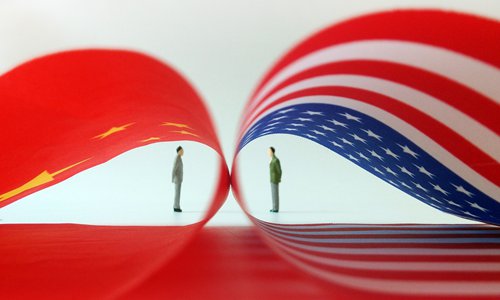HOME >> OPINION
Humble China shouldn’t be accused of being high-profile
By Hu Xijin Source:Global Times Published: 2019/6/17 19:43:40

Photo: IC
Elephants cannot hide behind small trees. Should China be blamed for not keeping a low profile?China is being strategically targeted by the US, with waves of crackdowns. Chinese people are accustomed to introspection in face of trouble. Some of them therefore think: Could we have avoided the American attempt at containment had we been more low-key and discreet?
It is not a bad thing to like to reflect. Keeping a low profile is always an important factor in China's strategic considerations. At the same time, we must be clear about one basic fact: Has China been a high-profile country?
To be fair, we are not.
To give a simple example, most international strategists believe that China has completed the development of the DF-41 intercontinental ballistic missile.
But until today, there has been no official information about it. Rare photographs of the DF-41 carried by trucks were taken by military enthusiasts and could not be verified. It is in keeping with China's habit to release official information until the strategic missiles are ready to be deployed, regardless of the development process.
In international opinion, China is often seen to be "not transparent enough." If other countries have powerful weapons, they will not hesitate to use them for deterrence. But China's restraint is deeply rooted, and the process of demonstrating strategic power has not changed.
Is China's construction of islands and reefs in the South China Sea meant to flex its muscles? China has always been a low-key player in the South China Sea. We are fully capable of taking back the islands and reefs occupied by other countries within the nine-dash line, but we have exercised restraint.
China's construction on the South China Sea is based on the islands and reefs under our control. It hasn't deployed any offensive weapons on them after the construction, and there are only some defensive armaments.
Compared to US military bases all over the world, China's construction of Nansha islands and reefs is mainly for civilian use as it openly claims. Is this a challenge to American hegemony?
The US is concerned with the China-proposed Belt and Road Initiative. I work in the media and knew from the very beginning that the BRI is an initiative, not a strategy. The BRI is open and follows the principle of extensive consultation, joint construction and shared benefits. All countries are welcome to participate and China is sincere about it. How can China be viewed as challenging US hegemony?
Consider Taiwan Island. If the Tsai Ing-wen administration had not created a stir and refused the 1992 consensus, the Taiwan Straits would have been calm.
Being a journalist for 30 years, I have always known that China has a tradition of publicizing achievements before the National Day every year, before every CPC National Congress and ahead of important political events. In addition, China likes to make long-term planning: what should be achieved by 2000, by 2020 and by 2025. This is a feature of China and a way for mobilizing our society. China has suffered a century of humiliation and its society sometimes needs some encouragement. Opening ceremony of Beijing Olympic Games in 2008 was very grand, which met the psychological needs of the Chinese people. In the early 1990s, we bid for the 2000 Olympic Games. When we lost the bid, many people cried on their bicycles. At that time, we were very poor.
China's past plans didn't draw much attention from the US. Why is the US reacting so strongly to China drawing plans now? It is not because China has become more high-profile, but because the US has changed its attitude toward China. It can't accept that the Chinese economy has expanded to over 60 percent of US economy and continues to grow. Washington wants to have a certain kind of strategic showdown with China.
Not long ago, Indian Prime Minister Narendra Modi announced that India would become the world's third largest economy by 2030. Germany is ambitious with its Industry 4.0 strategy. The US is fine with both. But it was a "Made in China 2025" plan we made a few years ago that provoked the US.
The trade war and the technological crackdown that the US has launched against China is out of US selfish strategic purposes. It is not the fault of the Chinese people. The Chinese nation's progress and the way of self-advancement are our basic rights. Our self-esteem and self-confidence cannot be abandoned under any circumstances.
We can and should continue to learn from experience, including adjusting strategies to meet our needs. But we should not take the blame for others' fault and selfishness, nor should we accept groundless accusations.
China, the only major country that hasn't fought a war in 30 years, shouldn't be portrayed as a warmonger. A diligent Chinese nation cannot accept the US charge that China's revival is built on technology stolen from the US. In particular, we cannot accept the reputation of our students who are studying overseas to be tarnished with allegations of spying in the West. We are sincere and believe in mutual respect and mutual benefit. For this reason, I believe that self-esteem is the start, sincerity and humility the road, and courage and wisdom the vehicle to our goal.
The author is editor-in-chief of the Global Times. opinion@globaltimes.com.cn
Posted in: VIEWPOINT